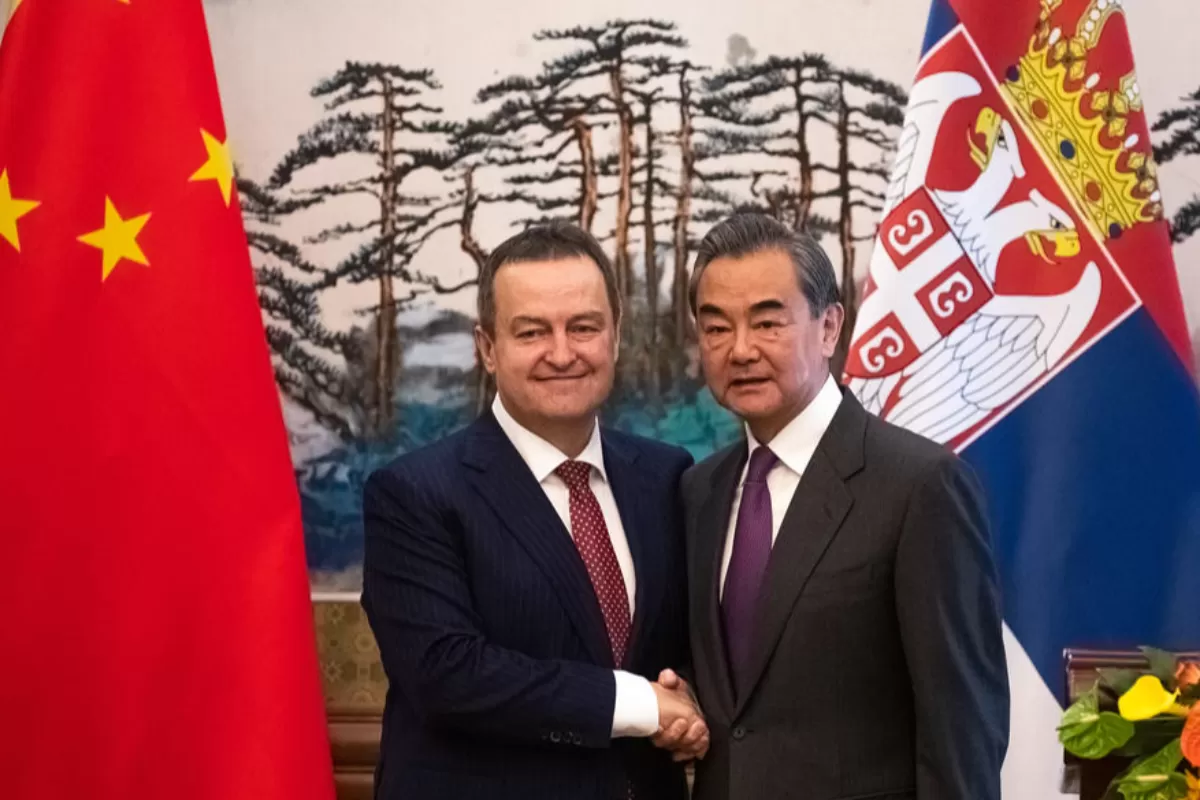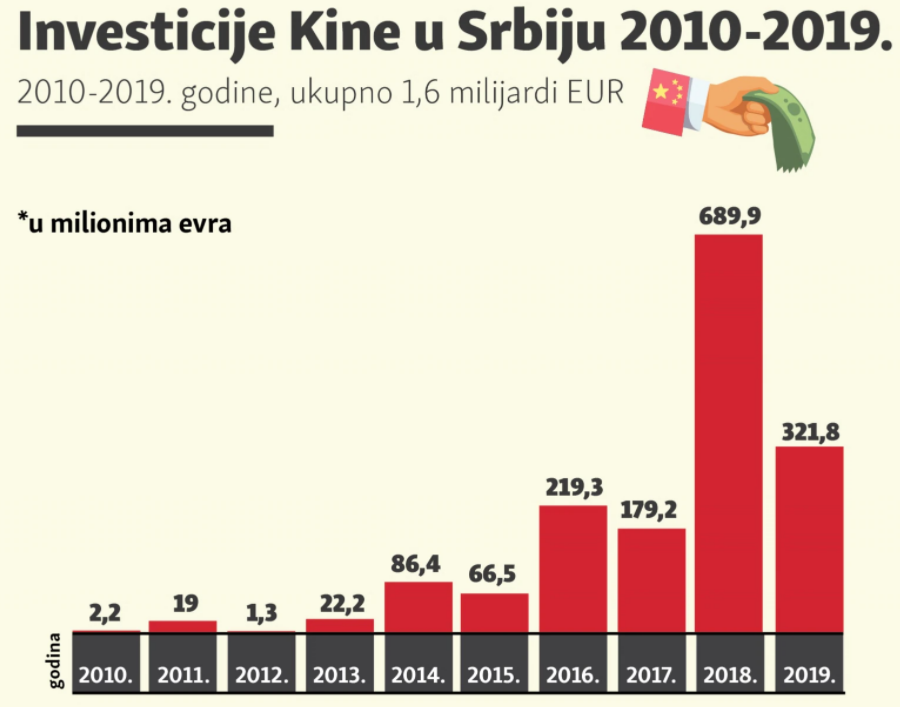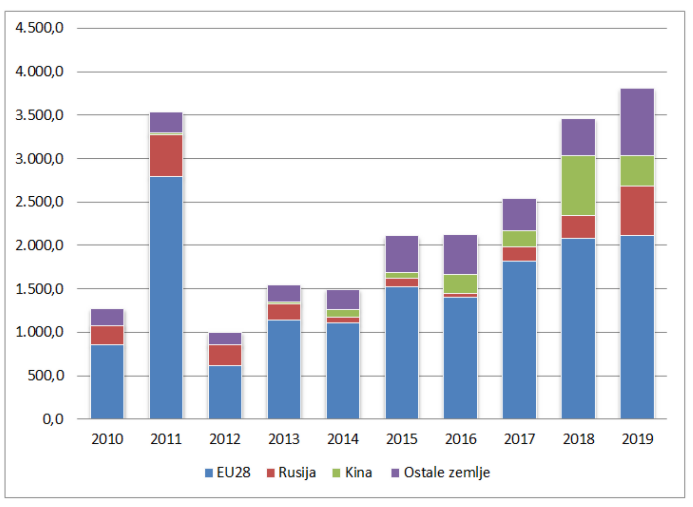
In the past few years, Chinese investments in Serbia have intensified, strengthening economic and strategic cooperation between the two countries. From 2010 to 2019, the value of Chinese investments amounted to 1.6 billion euros. However, in addition to investing in production, new technologies, servicing old debts, some of these investments have brought with them harmful effects on the environment, but also a further collapse of the legal system and institutions.

Graphic shows the Chinese investment in Serbia between 2010 – 2019.
To be more competitive in attracting foreign direct investments, developing countries, including Serbia, which have high needs for foreign capital, often adopt fewer standards in the field of environmental protection, and a frequent feature is the absence of the rule of law or non-compliance with existing regulations, doubled by corruption.
Investments that are toxic for the environment
Although the Republic of Serbia has signed many international agreements committing itself to promote and implement standards that ensure a healthy environment and conservation of natural resources, the government supports investments that have an obvious impact on environmental degradation and overexploitation of natural resources.

Graphic shows top foreign direct investments by EU, Russia, China, other countries
This has both economic and social consequences for the whole society. According to the report of the European Environment Agency on air quality, Serbia is at the very top of the countries on the European continent in terms of air pollution.
In its resolution, the European Parliament noted the lack of transparency in Chinese investments and credits and expressed concern about the weakening of the rule of law under their influence.
By amending the regulations, the Republic of Serbia has enabled the exemption of investment activities from the application of valid regulations, often declaring them infrastructure facilities of special importance or projects of national interest.
One of the examples of such a practice is the investment project of the company Shandong Linglong Tire, which is building the largest tire factory in the Serbian city of Zrenjanin. The data shows that in June 2020, the company was granted illegal state aid of a staggering 83.5 million euros, which consisted of direct financial aid of almost 76 million euros and 95 hectares of land that the state transferred to the company's ownership free of charge. Reliefs for the company were also given through the construction of infrastructure from public funds and the exemption from profit tax. Non-compliance with regulations continued with construction without building permits, without the necessary environment protection conditions and without an approved environmental impact assessment study.
Just a few months ago, journalists from a Dutch television station were disrupted by security at the Linglong tire factory in Zrenjanin during the filming of a report with a local activist. This television report referred to the plan for the company to illegally expand to several hectares of land around the factory. A similar incident occurred in early June, when Serbian journalist tried to report about the construction of this factory.
It is important to understand that in this case, it is not only about the arrogant behavior of a foreign investor, but also about the state, institutions and the system that enabled such behavior, and then closed their eyes and remained completely silent.
Environmental pollution and the weakening of the rule of law afflicted city of Bor as well. In 2018, the company Serbia Zijin Copper doo Bor took over the majority ownership of RTB Bor, which is associated with increasing and frequent pollution of air, water and land in Bor. The agreed amount of FDI (Foreign and Direct Investments) was 1.26 billion dollars that Chinese Zijin should invest in the smelter in 6 years. Shortly after Zijin took over the operation of the smelter, citizens began to complain more and more about excessive air pollution, which is the reason they have organized protests and filed criminal charges against the company, the city of Bor administration and the state. Excessive air pollution was also confirmed by official reports of the Environmental Protection Agency, which show that during the previous two years there were several dozen cases in which the concentration of sulfur dioxide in the air in Bor exceeded the values dangerous to human health.
Unfortunately, Zijin is not the only Chinese investment that brings with it harmful effects on the environment. The state-owned giant Steel Smederevo was sold to the Chinese HBIS group. The debts of the company were taken over by the state, while the Chinese investor announced the investment of 300 million euros and the preservation of 5,200 jobs. Jobs have been saved, exports are growing, the company's profit is increasing from year to year, however, the price was that this largest employer in Smederevo became one of the largest polluters in Serbia.
Borrowing from Chinese banks is not always a good idea
When it comes to respecting the standards of environmental protection when implementing projects supported through loans from foreign banks, we also see significant differences, this time in relation to who the creditor is.
Chinese banks are among the leading creditors on a global level, and they are mostly oriented towards supporting large construction projects. In Serbia, infrastructure projects supported by China are being implemented based on interstate agreement, which relieves the Chinese partner of the obligation of public bidding, payment of VAT and customs duties, whereby works are mostly performed by Chinese companies and Chinese workers, and details of credit agreements are not available to the public. Projects financed by Chinese loans often have a negative impact on biodiversity conservation and climate stability
Among the latest projects that China supports in Serbia, is the planned Belgrade-Zrenjanin-Novi Sad highway. Apart from the suspicion that this road is being built for easier transport of goods from the future tire factory in Zrenjanin, and not for the real needs of the citizens, the damage that its construction could do to the environment is dangerous. Namely, the route passes through as many as three protected areas, two areas that are in the process of protection and several internationally important areas for biodiversity conservation, and there is no strategy for reducing the highway’s impact on the environment.
In addition to investments in heavy industry, the share of Chinese loans for various, mostly infrastructure projects in Serbia has increased in the last few years. Chinese lending is not surprising, considering that in the last two decades, China and its state-owned banks have become the world's largest lender, approving over 700 billion dollars in loans, more often to underdeveloped countries in Africa and Asia.
The experience of these countries shows that some cases of inability of states to service their debts to Chinese banks have catastrophic consequences for these underdeveloped countries, as it happened when Djibouti had to turn over to the Chinese a military base, and Sri Lanka did the same with its largest port. These loans are often contracted behind the scenes, non-transparently, by direct contracting between the two parties. Backed by interstate agreements, such loans are used for large infrastructure projects such as the construction of highways, railways and ports around the world.
China and its banks often bypass the complicated and democratic procedures required by international creditors, so lending from them is very tempting in a corrupt environment.
Representatives of the authorities in Serbia, in their media appearances, equate such Chinese loans with investments, although these two categories are far from similar. In the case of Serbia, the ratio between Chinese investments and loans is 1: 3, which means that one quarter of economic cooperation is investments, while three quarters are loans.
In this way, in addition to concluding economically viable deals as a lender, China also pursues its strategic interests, creating political dependence on less developed countries through economic dependence. The constant risk of debt bondage and financial burden creates a relationship of subordination and dependence that can easily be used to project political influence.


